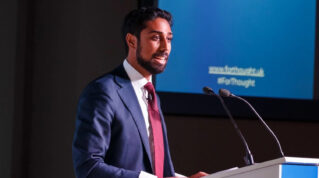Students at AELP’s first-ever green skills summit say sustainability should be learnt alongside English, maths and digital, writes Nichola Hay
Last week AELP held its first-ever green skills summit. The event, sponsored by the Skills Network, was a success. But it also showed there’s still much work FE can do to help reach net zero and to transition towards a green economy.
Increasingly, AELP members have been highlighting how vital sustainability is becoming to our sector. AELP hosting its first green skills summit felt like an important step towards answering some of the challenges facing us.
Discussions throughout the day were thought-provoking. One key message came through consistently: this is not a time to rest on our laurels. We need to take more action.
I was delighted to chair the event and it was great to hear from a wide range of speakers, including skills minister Alex Burghart and deputy mayor of London Jules Pipe. We also heard directly from four young people working in the green economy.
Seray, Carys, Kofi and Ismail expressed exactly why sustainability is so important. They said sustainability is increasingly being seen as the “fourth functional skill” alongside English, maths and digital.
It is becoming clear that sustainability and low carbon should be embedded into every curriculum as the fourth functional skill.
This would also be about changing individual behaviours – to think and act differently. It’s a skill that recognises the impact we each have on the environment, every day.
However, teaching this skill does present a major challenge to educators, as there is currently a real gap in training, knowledge and resources available to the sector to deliver for our learners. There is not just a need to train our learners on this, but to upskill and support those delivering training too.
However, the positive news is that the summit showed there’s a real enthusiasm in the skills sector to ensure we are not just responding to employers’ demands, but that we’re showing leadership too.
The immediate challenge following the event is to harness that enthusiasm and put it into action.
Achieving the government’s ambitions to reach net zero by 2050 presents a sizeable challenge to the wider economy ̶ and we can’t wait until that deadline to make the changes needed.
There will be two million new green jobs by 2030. The green jobs taskforce has a huge role to play in ensuring people have the necessary skills. But we also need government to recognise that independent training providers are well placed to deliver much of the skills training required.
Young people also need to know there are opportunities open to them. That starts with proper careers guidance that outlines all available options, including parity for academic and vocational routes.
That’s why we’re so keen to see the government use the skills and post-16 education bill to enforce the Baker clause.
We also need to ensure people get work experience in those careers – whether that’s short-term work experience or structured schemes such as traineeships.
The enthusiasm amongst young people in particular could easily turn to frustration if we don’t prove we’re serious about sustainability.
Enthusiasm among young people could easily turn to frustration
That’s why I’m pleased that AELP has committed to setting up a “task and finish” group that will look at how to introduce a sustainability charter for ITPs, similar to its code of good governance.
This charter, underpinned by key green and ethical principles, will enable providers to show that sustainability is at the heart of what they do – giving confidence to learners that this is a sector that takes our environmental impact seriously.
We will also need to work with the Institute for Apprenticeships and Technical Education (IfATE) to ensure these skills are properly embedded into apprenticeship standards, with appropriate funding for providers.
Climate change will force us all to live differently. Hosting a green skills summit felt like a breakthrough moment.
But we cannot afford to stop here. We will need to make real changes – and quickly.















Organisations teaching sustainability but failing to act in a demonstrably sustainable way are likely to create a degree of cynicism amongst learners and diminish the impact of the initiative.
Perhaps alongside making it a 4th functional skill, it should also be given the same status as safeguarding and prevent in terms of provider behaviour and approach.
In a nutshell, practice what you preach and try to ensure that whatever the end product looks like, it is immune to accusations of greenwashing.